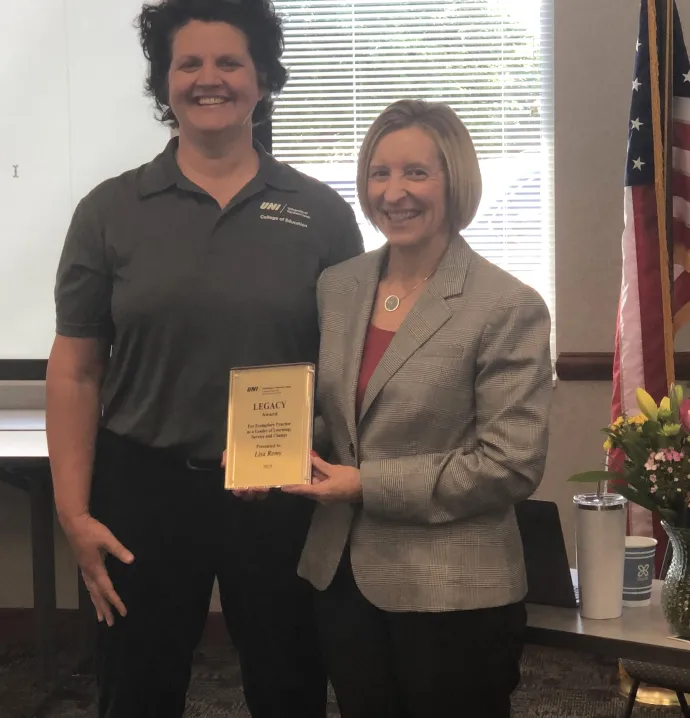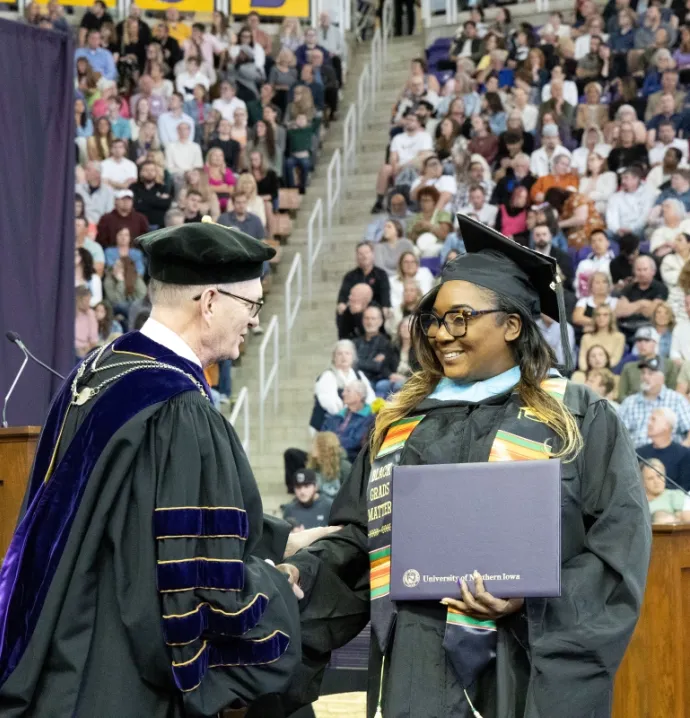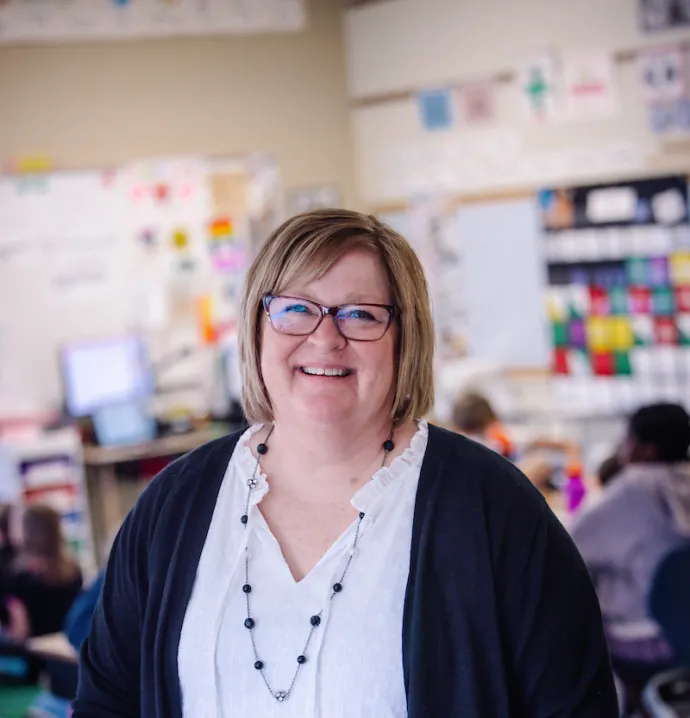A Unified Path for Early Childhood and Special Education
A Unified Path for Early Childhood and Special Education
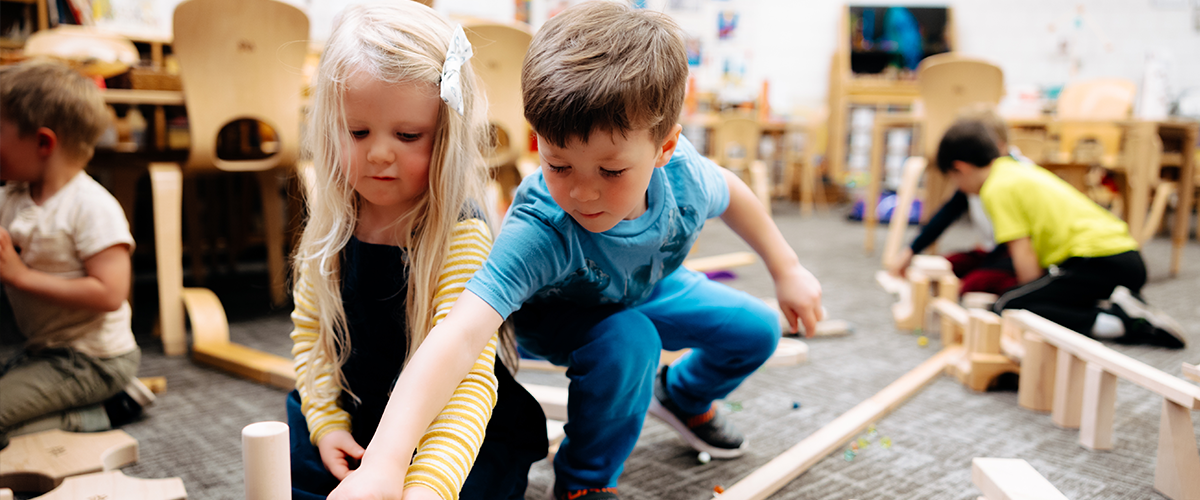
Preparing tomorrow’s teachers requires expertise, skill … and listening.
“As faculty, we are really trying to listen to our students for what they need, what they’re passionate about,” says Allison Pattee, clinical assistant professor of instruction, and, for the past two years, the early childhood education program coordinator.
Many early childhood education majors like the pre-primary level of teaching, including preschool and kindergarten, she says. And school districts seek educators who can teach both general education and special education as they grapple with an ongoing shortage of special education teachers.
The College of Education faculty listened and responded. Since 2023, University of Northern Iowa has offered a unified early childhood education curriculum which meets requirements for Iowa endorsement #1001 for birth through third grade in inclusive settings.
This approach lays a foundation within the early childhood education major (Bachelor of Arts) that is particularly beneficial for the voluntary four-year-old preschools now in school districts across Iowa. “That’s really where the #1001 has grown interest. Before you may have been able to teach preschool, but not have been able to teach an inclusive classroom,” says Pattee. “That’s been the higher interest in terms of employers, to be able to have staff that are certified in essence for both.”
As the 2024-25 academic year begins, this inclusive approach will have immediate impact statewide with two additional program developments:
- A new online transfer program for early childhood education, approved by the Iowa Board of Regents in February 2024, provides placebound community college graduates the opportunity to earn this degree.
- Streamlined articulation agreements with community colleges, which should smooth the transition from an associate of applied science (AAS) degree to an early childhood bachelor of arts (BA) degree – whether online or on campus.

Both efforts increase access to this inclusive early childhood education degree at UNI. The online transfer program students began their first classes in May.
“I’m so excited that we’re able to give students those experiences through UNI and continue to grow and provide similar experiences between the on-campus and transfer online students,” Pattee says.
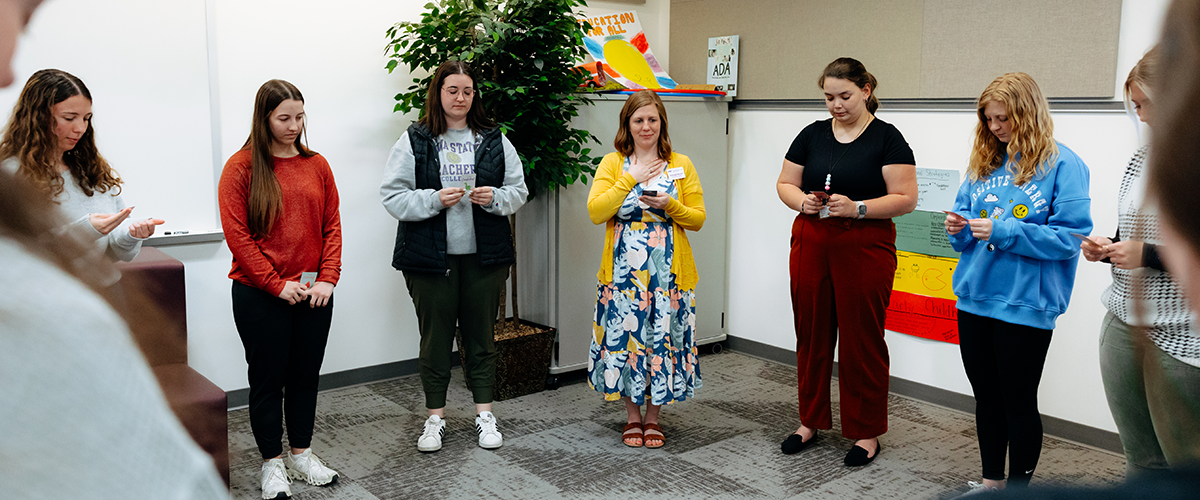
A smoother path from AAS to BA
Allison Pattee and Allison Barness, assistant professor, early childhood education, have been working with COE Director of Advising Jenny Connolly, her advising team and UNI Transfer Admissions to secure articulation agreements that create a smoother path toward a BA in early childhood education after completion of an AAS.
“This all started because Allison and I had a vision of building relationships with our partners in education, the community colleges around Iowa. The challenges were many, mainly because most of our early childhood students transfer in a technical degree (AAS) which doesn’t always play nice with our system,” Barness says.
The effort has entailed exacting work between UNI and each community college to map out a course outline as students move through the community college which better positions them to complete their degree in two years plus student teaching.
As of June, agreements with Des Moines Area Community College, Hawkeye Community College and Kirkwood Community College were in place. The goal is to have agreements with all eight community colleges which offer the full AAS degree.
Field experiences reflect blended approach
Whether choosing on campus or online, students find field experiences reflect the unified curriculum. In addition to the standard coursework preparing them to teach in child care centers, preschools and in classrooms, today’s early childhood education majors learn the basics of home interventions, how to write individualized family service plans (IFSPs) and individualized education plans (IEPs), how to create goals and assessments and work with children, their families and Area Education Agency specialists.
In a key course known as “guidance” prior to student teaching, each pre-service student gains 40 additional hours hands-on in an inclusive preschool classroom setting.
“That’s something that we’re really proud of, that we feel is valuable,’’ says Pattee. The 40-hour experience is personally planned by the early childhood education faculty using contacts across the Cedar Valley region. “We have really tried to give students varied experiences, practicing some of the skills that we know they need to have to be successful as teachers–not just their teacher skills, but working with students in differentiating and planning and collecting data.”
Pattee and her colleagues look forward to working with additional preschool settings across Iowa to ensure placebound students have a similar “guidance” experience locally.
Collaboration among faculty in early childhood education and special education was key to making this shift successful. Special education’s Wu-Ying Hsieh worked closely with the department to modify the curriculum toward an inclusive orientation and remains a key liaison. Others, like Stephanie Schmitz in school psychology, have joined in as well.
“We have back and forth conversations about what needs we’re seeing and how we can help our students understand and be more comfortable with, for example, IEPs and goal writing,” says Pattee. “We’re looking at it from different lenses. We’re able to offer unique understanding and expertise from our areas of study.”
Pattee expects those conversations to flourish with the addition of Dawn Mollenkopf, who joined the college this fall as the Averyle Westphal Ehrle Professor of Early Childhood Education. Mollenkopf previously served as a professor with an emphasis on the early childhood inclusive endorsement at the University of Nebraska at Kearney.
Creating quality, appropriate classroom experiences
From establishing a unified curriculum to adding the online transfer program and creating a smoother pathway from an AAS to a BA in early childhood education, the faculty have sought solutions that bring benefits, remove barriers and ultimately result in quality education.
“The goal is to ensure confident, successful, well-trained teachers who understand student development, have the skills to support inclusive classrooms and can provide the appropriate classroom experiences for their students,” Pattee says.
“Everyone on the early childhood team really feels strongly and passionately about the importance of play and the importance of developmentally appropriate experiences,” she adds. “Our youngest students are having the opportunity to develop their social and emotional growth, their fine motor and gross motor skills as well as their academics and are having positive experiences in the inclusive classroom.”
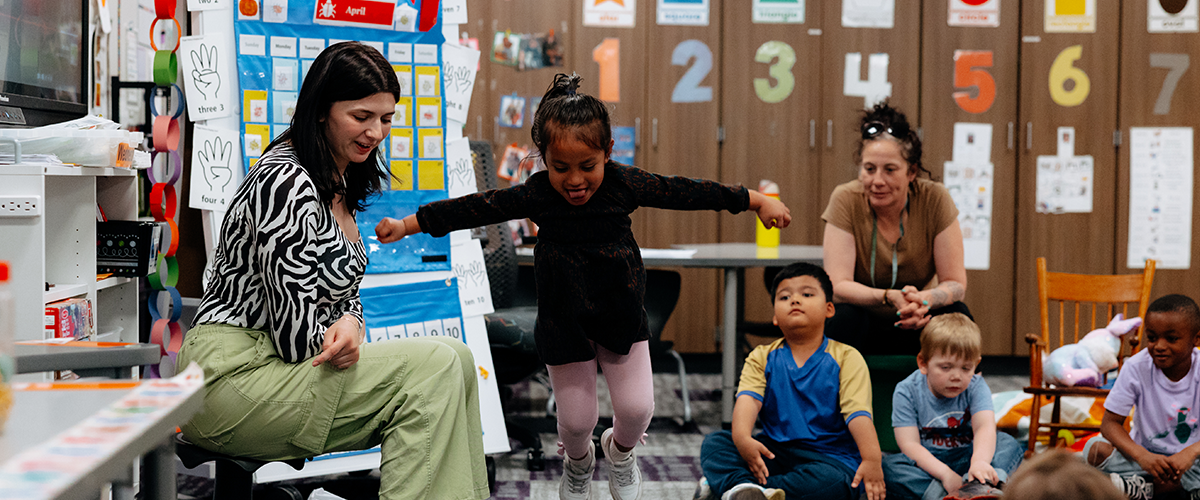
Special education minors add to the toolbox
Specific minors in special education provide a more in-depth base of knowledge and skills and, as a group, remain among the leading minors chosen for study by undergraduates at UNI.
While the inclusive early childhood education degree and its new online BA option provide a sound foundation, the early childhood special education minor goes even deeper into special education and working with students with special needs.
“Students recognize being a teacher is hard. We talk a lot about your tool box, and we are recognizing with the early childhood special education minor, we are just adding more tools,” says Allison Pattee of the minor which leads to the #262 endorsement (PreK-K).
Within an inclusive, preschool classroom setting, the students in this minor work to meet the needs of students who are categorized as lower incidence disability, or higher needs. “Our pre-service teachers work with a child one-on-one and in small groups and large group settings while meeting the needs of their IEP and goal areas,” she says. “They do receive additional training in various special education strategies and interventions, as well as assessments and data collection.”
For elementary or secondary education majors, the special education instructional strategist minors prepare future teachers for working with students with mild to moderate special needs or intellectual disabilities.
New this fall, practicing teachers can now add to their skillset with online pathways to instructional strategist I and II, along with coursework that can lead to the K-12 behavioral disorders or learning disabilities endorsement in Iowa.
For more, go to: https://online.uni.edu/sp-ed-endorsements.


